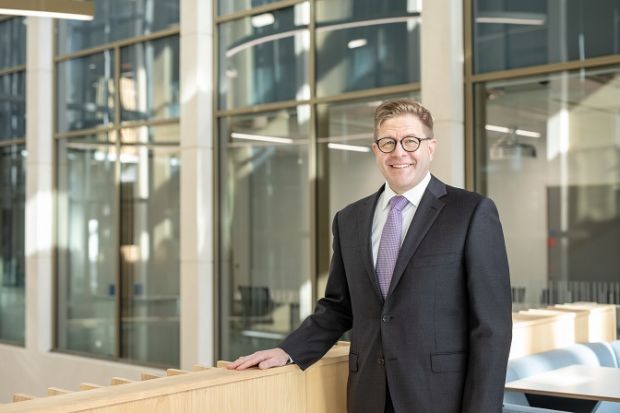Universities should talk about going digital, not online, to reassure students who want to get an in-person experience, the man behind one of the UK’s most ambitious education transformation strategies has said.
Jeff Grabill, deputy vice-chancellor, student education at the University of Leeds, has set himself the “exceptionally difficult” task of trying to redesign teaching and assessment for the next 20 years. With the overhaul, those who choose to be on campus will get a “deeply in-person and engaging” experience, but it will also be one that is supported by “digital technologies”, he explained.
The next generation of learners, the cohort currently considering studying at Leeds, has not been put off by the digital-first approach in areas such as exams, Professor Grabill said, and he did not foresee a clash with the Westminster government, which seems intent on pushing the in-person experience.
Instead, he continued, the strategy’s aim was to preserve the best things that were learned during the pandemic and to expand the university’s online offering, particularly in support of the lifelong learning agenda, which he predicted could bring thousands of learners to Leeds, many of whom would rarely – if ever – step foot on the campus.
“There’s a lot of confusion around what to call different educational experiences,” said Professor Grabill, who joined Leeds from Michigan State University during the pandemic.
“We have fully online programmes; they [students on such courses] are having an online educational experience that they choose. None of our students in Leeds are having an online experience. It is on-campus and in-person; it just has different technologies associated with it.”
Those who had chosen to learn online “love it” because it works for them, he said, but those who wanted to be on campus had been dissatisfied during the pandemic because of the mismatch between expectation and reality.
Professor Grabill said it was the scale of what Leeds is trying to do, under the leadership of vice-chancellor Simone Buitendijk, that attracted him to cross the Atlantic to take up the position.
He said the education strategy was one of the most transformative he has seen, with its focus on equipping students to move into communities and work with the skills needed to tackle some of the huge challenges the world faces.
Changes coming to the campus for the next generation of students include “less passive” classroom experiences, giving learners more access to their own data, greater emphasis on enterprise, with students encouraged to develop ideas for businesses, and closer links to industry.
Leeds was going for a “big, broad-based and comprehensive approach” to meet the growing demand for higher education in the coming years, said Professor Grabill, who nevertheless acknowledged that there was also a case for other institutions becoming more specialised. The UK sector, he predicted, would become more differentiated in a similar way to his native US.
Although he has encountered many parallels since moving countries, he said, he has noticed that the UK sector faces a higher regulatory burden, which takes up more time and energy.
“There’s good reason for it. It’s been fun to learn and fun to grow into that culture, but it carries significant costs and also impacts the ability of UK higher education to adapt,” he said.
“The more regulated it is, the more difficult it is for agility, innovation and adaptation. That will be one of the challenges in the UK; how to balance regulation with expectation from the public that universities innovate and grow and adapt to the needs of society.”
Register to continue
Why register?
- Registration is free and only takes a moment
- Once registered, you can read 3 articles a month
- Sign up for our newsletter
Subscribe
Or subscribe for unlimited access to:
- Unlimited access to news, views, insights & reviews
- Digital editions
- Digital access to THE’s university and college rankings analysis
Already registered or a current subscriber? Login








